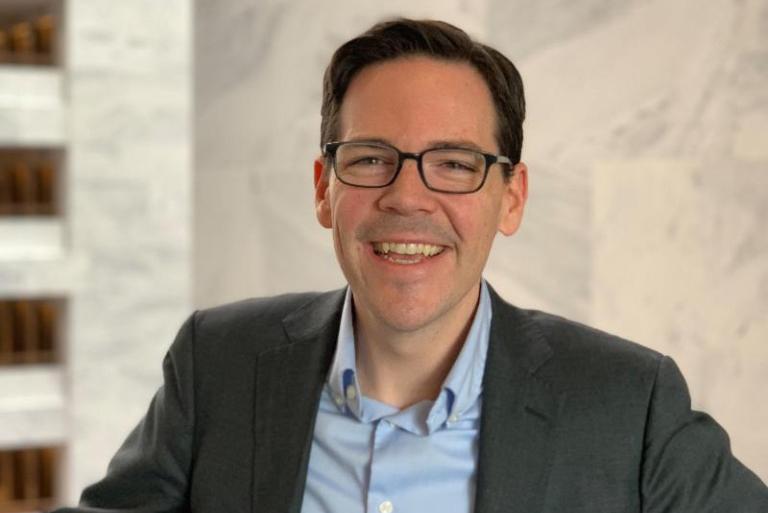Serving Underserved Communities

A past policy director for a U.S. Senate Committee and a past economics policy advisor for U.S. Sen. Jeanne Shaheen, political science and policy studies major Chris Neary ’06 helps to develop and execute public policy goals as the vice president of policy research and advocacy at Cinnaire, a nonprofit financial institution. Through his work, he uses skills honed on Capitol Hill to build support for policies that help organizations in underserved communities with projects such as affordable housing and community facilities.
Can you speak to how Dickinson’s useful liberal-arts education helped you along your career path?
Getting a job on Capitol Hill is very competitive, especially the first few years after college. There are a lot of young, smart people who want to make a difference and be where the action is. Dickinson’s approach to education prepared me to make the most of the opportunities that came my way. On Capitol Hill, you can’t always be an expert in any given subject, but you need to learn quickly, think critically and communicate effectively. I think Dickinson’s focus on teaching students how to learn is what sets it apart.
What was your favorite activity/organization at Dickinson?
It’s hard to pick just one. No matter what you do, you are surrounded by people who feel just as passionately about the activity as you do—maybe even more so. You get to work with smart people who force you to hone your skills and have a great time doing it.
What jumps out as a great memory from your time at Dickinson?
I’m stretching the definition of a single “memory,” but spending junior year in Bologna had the most impact on me. It changed my worldview.
How do you stay involved with Dickinson?
I try to be a resource for current students or recent graduates who are interested in working in politics and government. It’s not always the easiest world to navigate, and I benefited from other Dickinson alums who helped me learn the ropes.
How did you get interested in your work, and what about it excites you most?
I wanted to work in government because I was raised to be aware of the impact that public policy has on people’s lives. For me, it was obvious that policy was the place where I could make the most impact. While it’s easy to be cynical about government, it’s still a worthwhile place to for people to work—maybe now more than ever. While I’m no longer on Capitol Hill, I’m still working on public policy for a nonprofit where a positive mission that I care about drives people every day. I’m excited to use the skills and experience I developed in Washington to advance that mission.
What does your current work entail?
I work for a nonprofit financial services company called Cinnaire, which provides loans and investments for projects in communities that need it most. What drew me to Cinnaire was its core belief that all people deserve the opportunities provided by living in healthy communities. The mission-driven organizations and projects we support—especially affordable housing and community facilities—are essential components for creating opportunities for everyone. My job at Cinnaire is to develop and execute our public policy goals. Public-private partnerships and smart policies are essential to our work. My job is to understand how policy changes affect our ability to get things done and advocate for policies that help us further our mission and advance the communities we serve.
What is the most challenging part of your work?
Rising above the noise. It’s not the easiest time to get attention for issues that deserve it.
What comes to mind as something unforgettable that you’ve done since you graduated?
Working in the Senate came with a lot of great moments. My favorite was the first time I helped change a law. We heard from a veteran who had half of his pension check withheld suddenly because of an outdated statutory formula. The same thing was about to hit a wave of veterans. We came up with a reasonable alternative, but we had to change the law to do it. It was a real lesson for me, because if my boss had not cared about the issue, there’s a decent chance it wouldn’t have been fixed. I saw how much it matters to have policymakers who care—and know how to get things done.
If you could have dinner with anyone famous, living or dead, who would it be?
My wife, who is not a Dickinson alum, thought I would say Benjamin Rush, but I think that’s a little too obvious. I’ve always been fascinated by former Chief Justice Earl Warren. While he wasn’t perfect, his court decisions—especially on civil rights, voting rights and privacy—shaped modern America in a way that I think is underappreciated. He also forged consensus and helped the court speak with authority on difficult social issues. I’d love to hear how he wound up getting a unanimous decision on something as contentious as Brown v. Board, for example.
You just built a time machine: where and when do you go?
Other than going to the future and coming back with renewable energy and medical advances, I’d go as far ahead as I’d need to see the Phillies win another World Series. I’m hoping that day is not too far away.
If you could change one thing about your life, what would it be?
I don’t think I’d change much. Of course, I wish I could have prevented some bad things from happening and that I could tell my younger self what I know now. But life is about the journey and learning along the way. Overall, I’m very lucky to be where I am.
TAKE THE NEXT STEPS
Published November 10, 2019